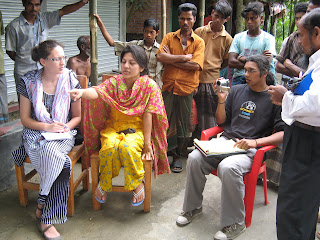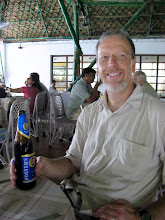 The light rain finally came to an end as we turned off the main highway onto a dirt road and entered the village. We were met by a farmer who had help to arrange our meeting. The road narrowed as we got farther from the highway and approached the village, until it became almost a path. As we approached a small building across from a school, we were met by the villagers. Focus groups are a staple of primary market research. The idea is to engage the potential customer in discussions concerning your product idea and to have them help you design the key features and define tradeoffs. Key to success in focus groups is appropriate participant selection, active participation by members, and forced choice among features. This is challenging enough in your native culture and language. Mitesh, Angie, and their translator Shaon, are perfecting their approach for conducting focus groups with poor farmers in Bangladesh while dealing with language barriers, cultural differences, and the constant attention of spectators (children and women) to the process. While Shaon translates the questions and answers, Mitesh and Angie try to dig deep to understand the true meaning behind the words they hear. Does 120 feet to water mean for drinking water, or irrigation water? Is it during monsoon, or during growing season? Does it mean that irrigation pumps must lift from this depth, or does it mean that, once tapped, the water rises? Does "Must be made in Japan" really mean the preference for a Japanese product, or does it mean that reliability is key? Does "We'll pay more for quality" translate into actual purchases of a higher cost, more reliable product? All of these questions are difficult to answer under the best of circumstances. Add in the challenges described above, and success seems unlikely. Yet, it must be done. The team needs to find a way. Dividing men from women gives the chance for women to respond. Dividing landless farmers from small farmers and medium farmers allows the group to reach consensus. And always, having something tangible to talk about makes the process much more productive. Focus groups are usually all about getting potential customers to talk. These farmers seem to have no restraint and gladly share their opinions on what they need.
The light rain finally came to an end as we turned off the main highway onto a dirt road and entered the village. We were met by a farmer who had help to arrange our meeting. The road narrowed as we got farther from the highway and approached the village, until it became almost a path. As we approached a small building across from a school, we were met by the villagers. Focus groups are a staple of primary market research. The idea is to engage the potential customer in discussions concerning your product idea and to have them help you design the key features and define tradeoffs. Key to success in focus groups is appropriate participant selection, active participation by members, and forced choice among features. This is challenging enough in your native culture and language. Mitesh, Angie, and their translator Shaon, are perfecting their approach for conducting focus groups with poor farmers in Bangladesh while dealing with language barriers, cultural differences, and the constant attention of spectators (children and women) to the process. While Shaon translates the questions and answers, Mitesh and Angie try to dig deep to understand the true meaning behind the words they hear. Does 120 feet to water mean for drinking water, or irrigation water? Is it during monsoon, or during growing season? Does it mean that irrigation pumps must lift from this depth, or does it mean that, once tapped, the water rises? Does "Must be made in Japan" really mean the preference for a Japanese product, or does it mean that reliability is key? Does "We'll pay more for quality" translate into actual purchases of a higher cost, more reliable product? All of these questions are difficult to answer under the best of circumstances. Add in the challenges described above, and success seems unlikely. Yet, it must be done. The team needs to find a way. Dividing men from women gives the chance for women to respond. Dividing landless farmers from small farmers and medium farmers allows the group to reach consensus. And always, having something tangible to talk about makes the process much more productive. Focus groups are usually all about getting potential customers to talk. These farmers seem to have no restraint and gladly share their opinions on what they need.
Friday, June 13, 2008
Focus Groups – Bangladesh Style…
 The light rain finally came to an end as we turned off the main highway onto a dirt road and entered the village. We were met by a farmer who had help to arrange our meeting. The road narrowed as we got farther from the highway and approached the village, until it became almost a path. As we approached a small building across from a school, we were met by the villagers. Focus groups are a staple of primary market research. The idea is to engage the potential customer in discussions concerning your product idea and to have them help you design the key features and define tradeoffs. Key to success in focus groups is appropriate participant selection, active participation by members, and forced choice among features. This is challenging enough in your native culture and language. Mitesh, Angie, and their translator Shaon, are perfecting their approach for conducting focus groups with poor farmers in Bangladesh while dealing with language barriers, cultural differences, and the constant attention of spectators (children and women) to the process. While Shaon translates the questions and answers, Mitesh and Angie try to dig deep to understand the true meaning behind the words they hear. Does 120 feet to water mean for drinking water, or irrigation water? Is it during monsoon, or during growing season? Does it mean that irrigation pumps must lift from this depth, or does it mean that, once tapped, the water rises? Does "Must be made in Japan" really mean the preference for a Japanese product, or does it mean that reliability is key? Does "We'll pay more for quality" translate into actual purchases of a higher cost, more reliable product? All of these questions are difficult to answer under the best of circumstances. Add in the challenges described above, and success seems unlikely. Yet, it must be done. The team needs to find a way. Dividing men from women gives the chance for women to respond. Dividing landless farmers from small farmers and medium farmers allows the group to reach consensus. And always, having something tangible to talk about makes the process much more productive. Focus groups are usually all about getting potential customers to talk. These farmers seem to have no restraint and gladly share their opinions on what they need.
The light rain finally came to an end as we turned off the main highway onto a dirt road and entered the village. We were met by a farmer who had help to arrange our meeting. The road narrowed as we got farther from the highway and approached the village, until it became almost a path. As we approached a small building across from a school, we were met by the villagers. Focus groups are a staple of primary market research. The idea is to engage the potential customer in discussions concerning your product idea and to have them help you design the key features and define tradeoffs. Key to success in focus groups is appropriate participant selection, active participation by members, and forced choice among features. This is challenging enough in your native culture and language. Mitesh, Angie, and their translator Shaon, are perfecting their approach for conducting focus groups with poor farmers in Bangladesh while dealing with language barriers, cultural differences, and the constant attention of spectators (children and women) to the process. While Shaon translates the questions and answers, Mitesh and Angie try to dig deep to understand the true meaning behind the words they hear. Does 120 feet to water mean for drinking water, or irrigation water? Is it during monsoon, or during growing season? Does it mean that irrigation pumps must lift from this depth, or does it mean that, once tapped, the water rises? Does "Must be made in Japan" really mean the preference for a Japanese product, or does it mean that reliability is key? Does "We'll pay more for quality" translate into actual purchases of a higher cost, more reliable product? All of these questions are difficult to answer under the best of circumstances. Add in the challenges described above, and success seems unlikely. Yet, it must be done. The team needs to find a way. Dividing men from women gives the chance for women to respond. Dividing landless farmers from small farmers and medium farmers allows the group to reach consensus. And always, having something tangible to talk about makes the process much more productive. Focus groups are usually all about getting potential customers to talk. These farmers seem to have no restraint and gladly share their opinions on what they need.
Subscribe to:
Post Comments (Atom)

No comments:
Post a Comment